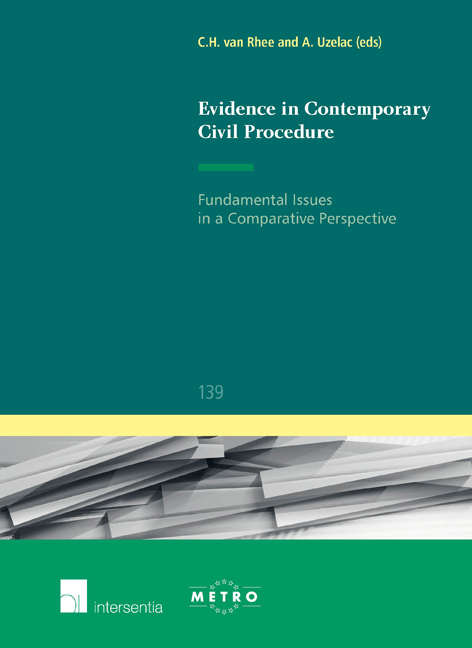Book contents
- Frontmatter
- Contents
- List of Authors
- Acknowledgements
- INTRODUCTION
- FUNDAMENTAL AND OTHER PRINCIPLES OF EVIDENCE IN CIVIL LITIGATION
- TYPES OF EVIDENCE IN CIVIL LITIGATION
- EVIDENCE IN ARBITRATION AND NATIONAL CIVIL LITIGATION
- REGISTRAR
- EVIDENCE IN CROSS BORDER CIVIL LITIGATION
- THE 1970 HAGUE EVIDENCE CONVENTION, THE EUROPEAN UNION AND THE 2001 EU EVIDENCE REGULATION - INTERFACES
- IUS COMMUNE EUROPAEUM
THE 1970 HAGUE EVIDENCE CONVENTION, THE EUROPEAN UNION AND THE 2001 EU EVIDENCE REGULATION - INTERFACES
from EVIDENCE IN CROSS BORDER CIVIL LITIGATION
Published online by Cambridge University Press: 15 December 2017
- Frontmatter
- Contents
- List of Authors
- Acknowledgements
- INTRODUCTION
- FUNDAMENTAL AND OTHER PRINCIPLES OF EVIDENCE IN CIVIL LITIGATION
- TYPES OF EVIDENCE IN CIVIL LITIGATION
- EVIDENCE IN ARBITRATION AND NATIONAL CIVIL LITIGATION
- REGISTRAR
- EVIDENCE IN CROSS BORDER CIVIL LITIGATION
- THE 1970 HAGUE EVIDENCE CONVENTION, THE EUROPEAN UNION AND THE 2001 EU EVIDENCE REGULATION - INTERFACES
- IUS COMMUNE EUROPAEUM
Summary
European Union – Relationships to Third Countries within theHague Conference
On 18 March 1970 the contracting parties adopted the Hague Convention on the Taking of Evidence Abroad in Civil or Commercial Matters (hereinafter the ‘Hague Convention’). In the context of the Convention, the present contribution will focus on the relationships and roles of the European Union and its Member States related to the Convention's implementation. The Hague Convention was negotiated during the Hague Conference. A majority of Member States of the European Union are currently among its parties. The EU itself is not a party to the Convention for two reasons. At the time when the Convention was negotiated the European Economic Community lacked the power to regulate aspects of private international law. Furthermore, based on the Hague Convention itself, an international organisation such as the EEC could not be among the contracting parties and the Convention also excluded any later accession by an internal organisation.
Since the 1970s there has been a significant shift in the division of competences between the Member States and the European Union in matters relating to aspects of private international law, as these aspects have become part of the EU's agenda. Obviously, this internal shift of competence has had an effect on the EU's relationships to third countries and international organisations. As a result, the EU was ultimately able to become a member of the Hague Conference. It took advantage of this opportunity and became actively involved in the Conference's activities.
The parallel membership of the European Union and Member States in the Hague Conference also brought about an adverse consequence for third countries in terms of uncertainty as to the actual scope of the existing competences of the EU entrusted to it by the Member States in the area of private international law. Indeed, it is important to define the boundaries of competence in terms of both practical implementation of the treaties negotiated at the Conference and potential liability for their breach under international law. It is important for third countries to know who will implement a treaty and against whom they should exercise any claims based on such liability.
- Type
- Chapter
- Information
- Evidence in Contemporary Civil ProcedureFundamental Issues in a Comparative Perspective, pp. 337 - 362Publisher: IntersentiaPrint publication year: 2015

